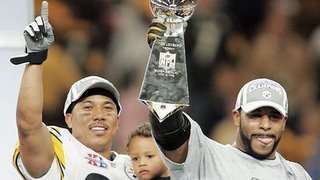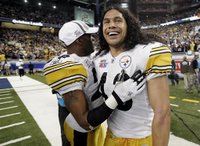 Ah, I lost a long post, so what to replace it with?
Ah, I lost a long post, so what to replace it with?The Pittsburgh Steelers won tonight's Super Bowl with a dazzling trick play. Receiver Antwaan Randle-El [great name!] took a handoff from back Willie Parker, ran to his right, and threw a 43-yard-touchdown pass to receiver Hines Ward (above, at left, with Jerome Bettis, Getty Images) to put the game out of reach for the Seattle Seahawks. Neither team played its best, either on the offensive side, where they dropped passes and barely escaped several fumbling calls, or on the defensive side, where some of the heralded players, like Joey Porter and Troy Polamalu (below right, at right, with Deshea Townsend, AP/Terrill), barely made an impression. Neither team's quarterback was spectacular, either. Even the Bus was pretty much grounded and out of gas. But Pittsburgh got several timely plays when needed in the second half, and that's all that mattered.
 To me, the most interesting parts of the event came at the very beginning: the parade of former MVPs before the start of the game, and Aaron Neville's strained rendition of the National Anthem. The way the spectators were wildly cheering for the former Steeler MVPs Lynn Swann and Franco Harris (one of my childhood favorites), you'd have thought the game was at Heinz Stadium in Pittsburgh. But then they ended up making it their own by the end of the evening anyway.
To me, the most interesting parts of the event came at the very beginning: the parade of former MVPs before the start of the game, and Aaron Neville's strained rendition of the National Anthem. The way the spectators were wildly cheering for the former Steeler MVPs Lynn Swann and Franco Harris (one of my childhood favorites), you'd have thought the game was at Heinz Stadium in Pittsburgh. But then they ended up making it their own by the end of the evening anyway.±±±
 I've always thought of the New York Review of Books is a good publication to check out if you've got scads of time and want to read people who also have time to burn--or at least time to write very long and often information-packed articles that start off as reviews but really end up being far more wide-ranging. A friend of mine used to ask if academics who regularly published there had actually cloned themselves or were robots. I still don't know, and since Joyce Carol Oates, among others, regularly appears in its pages, I don't think the possibilities as so enumerated are that farfetched.
I've always thought of the New York Review of Books is a good publication to check out if you've got scads of time and want to read people who also have time to burn--or at least time to write very long and often information-packed articles that start off as reviews but really end up being far more wide-ranging. A friend of mine used to ask if academics who regularly published there had actually cloned themselves or were robots. I still don't know, and since Joyce Carol Oates, among others, regularly appears in its pages, I don't think the possibilities as so enumerated are that farfetched.In an issue a few weeks ago, Ian Buruma, another utterly fluent writer, has a piece entitled "The Great Black Hope," a review of David Margolick's Beyond Glory: Joe Louis vs. Max Schmeling, and a World on the Brink. It's a lively read, about the canny Schmeling, the Nazis' and White Americans' desire for a White champion, and the gentle nature of the Alabama-born racial hero Joe Louis, whose first loss to Schmeling sank the hopes not only of Black Americans but many Jews, who hoped to see Hitler's favorite boxer soundly and roundly defeated. Here's one quote about the second fight:
For his second fight with Schmeling, Louis made sure he was prepared. He had mended his flawed technique. The old sluggishness was gone. Jack Blackburn had told him what the Nazis were saying about black people. They watched together the Nazi propaganda film about the first fight, entitled Schmelings Sieg. Louis was furious, especially in the light of Schme-ling's accusations, that a foul by the German, a late punch in the fifth round, had been cut from the film, while much was made of his own low punches. And the propaganda about Aryan supremacy was finally getting him mad. He didn't like "Smellin'," said Louis, "because his people don't like my people."
At the fight in New York in 1937 Duke Ellington, Tallulah Bankhead, Cab Calloway, Jimmy Rushing, and the Mills Brothers were all at ringside, along with Thomas E. Dewey and J. Edgar Hoover. And so were thousands of much poorer people who had spent their last savings just to be there. The streets of Harlem were packed with people dressed in their smartest clothes. The millions who couldn't be in Yankee Stadium were clustered around their radios. If most games that are more than games are about national pride, this fight was about more than that; at stake on that night in New York was the pride of all those who felt threatened by a brutal and, as it would soon turn out, murderous regime. As far away as Warsaw, Jews were praying for the victory of the "Schvartser Bombardier."
Joe Louis had told his trainers that he wouldn't need more than one round to exact his revenge on Schmeling. He was as good as his word. The fight barely lasted more than two minutes. In the words of Ernest Hemingway, "The Negro swung, hooked, swung and hooked at [Schmeling] as though he were the big bag." He hit him everywhere, on his face, his jaw, his head, his body. Louis later said: "I thought in my mind, 'How's that, Mr Super-race?'" And as Schmeling sunk [sic] to his knees, unable to get up again, and the referee declared Louis the winner, Helmiss cried "Unmöglich!" ("Impossible!") and Tallulah Bankhead jumped up and turned around to the Schmeling fans and screamed: "I told you so, you sons of bitches!"









No comments:
Post a Comment